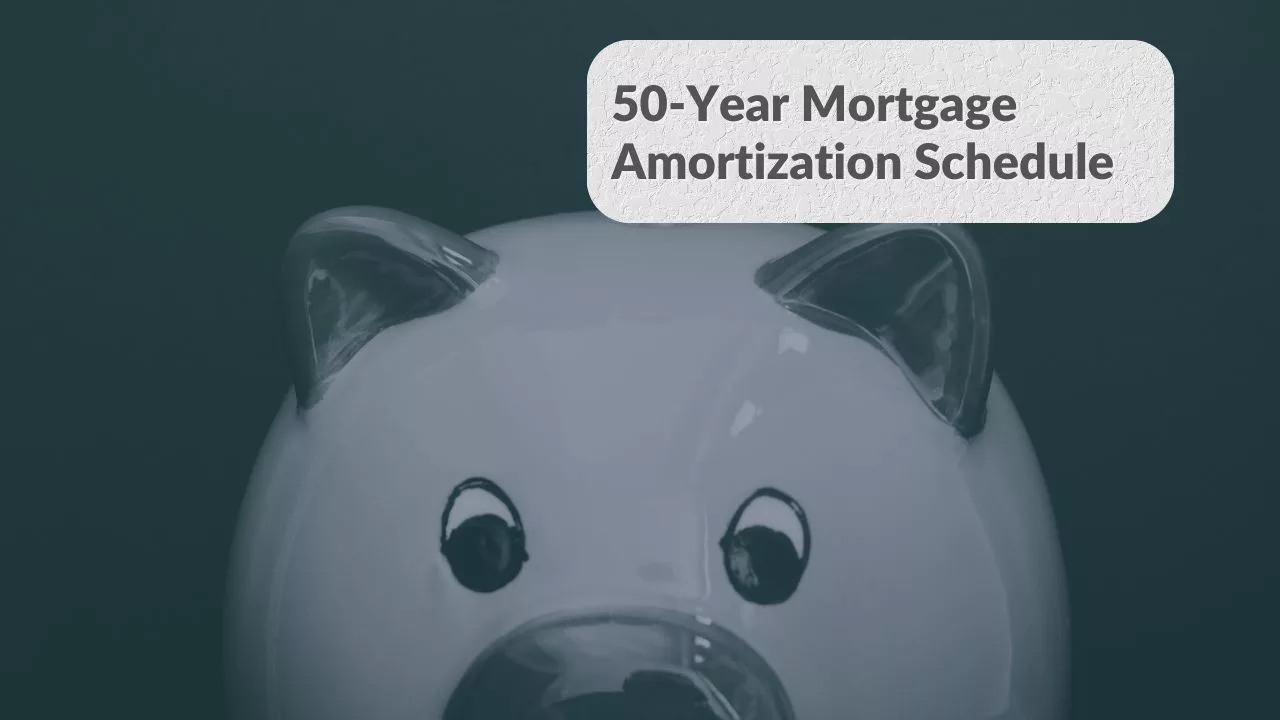Disclaimer, For educational use only, not financial, legal, or tax advice. Consult a licensed mortgage professional for guidance specific to your situation.
Quick Answer: A 50-year amortization schedule shows the month-by-month breakdown of a 600-month mortgage payment. It details how each payment splits between principal and interest, revealing the very slow equity build-up and high long-term interest cost.
- 600 payments (vs. 360 for a 30-year).
- Lower monthly payment than a 30-year loan.
- Significantly higher total interest over the life of the loan.
- Equity builds very slowly; extra payments help most.
Ever wondered what a 50-year mortgage really costs? Short answer: your house… and also your soul, probably. A 50-year mortgage is what happens when someone looks at a 30-year loan and says, “What if this lasted longer than my knees?” These ultra-long mortgages pop up every so often as a “solution” to housing affordability. And yes, the monthly payment is lower, which feels great, in the same way that only paying the minimum on your credit card feels great right up until you’re 89 and still financing that sandwich from 2023.
The tool below provides a free 50-year amortization calculator to generate a full schedule, a comparison of 30 vs. 40 vs. 50-year terms, and a look at the pros and cons of these extended loan terms. Jokes aside, some people actually want to understand what a 50-year mortgage means for their wallet, the costs, the extra interest, and whether paying more over time is worth having a place to call their own (and not “Mom’s guest room”). Maybe they’ll refinance later, maybe tax laws will change, maybe we’ll all be paying our mortgages in space credits; who knows. Our job here is just to show you the math in a nice, calm amortization schedule so you can decide without needing a paper bag to breathe into.
50-Year Amortization Calculator
How to Use This Calculator
- Enter your total loan amount, annual percentage rate (APR), and loan term.
- Add optional costs like annual property taxes and insurance for a full PITI estimate.
- (Optional) Add an extra monthly payment to see how fast you can pay off your loan.
- Click “Generate Schedule” to see your full breakdown and download your CSV.
Disclaimer: This mortgage amortization calculator is for informational purposes only. Results are estimates and do not include private mortgage insurance (PMI) or HOA dues. Mortgage rates may vary. Please consult a qualified financial professional.
Your Amortization Results
Download Your Printable Amortization Schedule
Get your full, detailed schedule as a CSV (Excel)
Amortization Table
This table shows the first 12 payments, followed by annual summaries for your loan. The CSV download contains the full month-by-month schedule.
Generate a schedule to see your amortization table here.
Embed This Calculator
Formula: How Amortization Payments Are Calculated
To understand your loan amortization schedule, it helps to know the mortgage formula used to calculate your fixed monthly principal and interest (P&I) payment (M):
M = P [ r(1+r)^n ] / [ (1+r)^n – 1 ]
- M = Monthly Payment
- P = Principal Loan Amount (your principal balance)
- r = Monthly Interest Rate (your annual percentage rate divided by 12)
- n = Number of Payments (Loan Term in years × 12)
In a 50-year fixed rate mortgage, **n = 600**. In a 30-year, **n = 360**. While ‘n’ is much larger, the payment ‘M’ only gets slightly smaller, which is the core issue with ultra-long-term loans.
Interest vs. Principal Over Time
On extended loan terms, your payments are almost entirely interest expense for the first one or two decades. This chart shows how slowly your mortgage loan balance drops on a 50-year term compared to a 30-year term, and how it impacts your return on equity. You can also track this using our future home value calculator spreadsheet.
Example: $400k @ 6.5%. Values rounded to nearest cent; excludes taxes/insurance/PMI.
30 vs. 40 vs. 50-Year Terms: Payment & Interest Compared
Look at the trade-off between monthly affordability and total cost. This table compares three common extended loan terms on a sample **$400,000 fixed rate loan at 6.5% interest**.
| Metric | 30-Year Loan | 40-Year Loan | 50-Year Loan |
|---|---|---|---|
| Monthly P&I | $2,528.23 | $2,284.45 | $2,184.84 |
| Total Interest Paid | $510,163 | $696,536 | $910,904 |
| Total Cost (P+I) | $910,163 | $1,096,536 | $1,310,904 |
| Equity after 10 Yrs | $49,619 | $25,328 | $14,585 |
Pros, Cons & Suitability of a 50-Year Amortization
Who Might Consider Ultra-Long Amortization
- First-Time Home Buyers: In high-cost areas like Johnson County, a 50-year term might be the only way to get a foot in the door. The plan must be to refinance. Before starting, see how to prequalify for a home loan in Kansas City and get your home buyer information sheet ready.
- Real Estate Investors: Investors focused purely on a real estate cash flow calculator may use the lowest payment possible to maximize monthly profit, especially for the BRRRR method. See how to analyze a short-term rental or invest in Kansas City real estate.
Risks and Considerations
- Massive Interest Cost: You will pay hundreds of thousands more in interest. You’ll see exactly how much interest when you generate your schedule.
- Slow Equity: You build equity at a glacial pace, making it hard to sell or refinance.
- Negative Equity Risk: If home values dip, you could easily owe more than the home is worth.
- PMI Costs: If you have a low down payment, you’ll pay private mortgage insurance (PMI) for much longer.
Frequently Asked Questions
Do 50-year mortgages exist in my area (Kansas/Missouri)?
True 50-year mortgages are extremely rare in the U.S. and not standard in the Kansas City metro. Most lenders do not offer them as a conventional product. They are more common as “loan modifications” or in specific foreign markets. Always talk to a local mortgage professional about available extended loan terms, as some may offer 40-year adjustable rate mortgages (ARMs) or other fixed rate loan options.
Is a 50-year amortization the same as a 50-year term?
Yes. The “term” is the total length of the loan (50 years). The “amortization schedule” or “amortization table” is the table that shows how that 50-year term is paid off, month by month.
Can I make extra payments and still use this schedule?
Yes! Our mortgage amortization calculator includes an “Extra Monthly Payment” field. Adding even a small amount extra will dramatically shorten your payoff date, pay off the mortgage early, and reduce your total interest paid. The generated schedule will reflect this faster payoff. (See our early payoff calculator).
How do taxes and insurance change the payment?
Taxes and insurance (the “TI” in PITI) are added *on top* of your Principal & Interest (P&I) payment. This excludes mortgage insurance (PMI). They don’t affect the amortization schedule itself, but they are a critical part of your total monthly housing cost. Our calculator adds these to show you an “Est. Total Monthly Payment.”
Next Steps
Now that you have your printable amortization schedule, what’s next?
- Generate & Download: Run your numbers in the calculator and use the “Download CSV” button.
- Analyze Your Numbers: Use the schedule to inform your long-term financial plan. A home buying spreadsheet (Excel) can help.
- Speak With a Pro: This tool is one of many financial calculators, but it’s for information only. To understand your specific options for buying a house in Kansas City, talk to a qualified mortgage professional.

